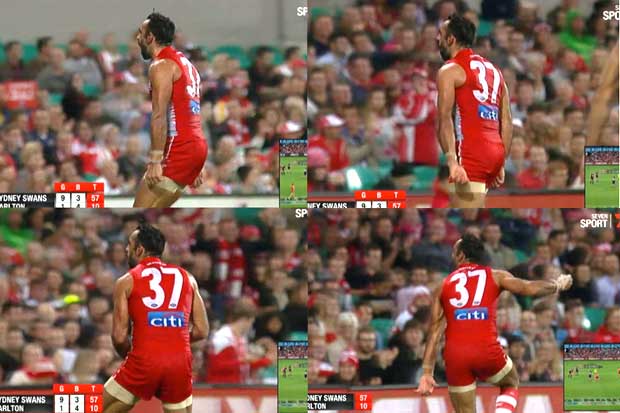Sporting history has given us several revolutionary acts. From the iconic picture of African American athletes Tommie Smith and John Carlos extending black power fists atop an Olympic podium, to AFL Aboriginal star Nicky Winmar lifting his jumper to confront racists with the colour of his skin, the power of our sporting heroes can’t be underestimated.
For the most part, sporting contests represent a safe space where white Australians can access black Australia, devoid of the uncomfortable truths that they have had to overcome on their path to sporting glory.
The athletic prowess of people like Greg Inglis, and Johnathan Thurston, Lance Franklin and Lewis Jetta, serves to overshadow the true reality in Aboriginal Australia – that we are behind on every health indicator, that we are shockingly over-represented in jailing rates, that our suicide and self-harm rates are a national emergency and that the rights to practice our culture and heritage are being severely undermined by governments all across the country.
Australians find it safe to idolise our Aboriginal sporting heroes because unlike other prominent Aboriginal people, their success is perceived to be divorced from this uncomfortable reality. Their Aboriginality is irrelevant to your respective team’s chances of winning a Grand Final.
They are positive images that conceal the negative images. They become unknowing icons for the belief that reconciliation can be achieved as long as blackfellas stop whinging and get on with it. It presents a distorted view of where we are in this country in regards to race relations.
So it’s no wonder Australians would prefer that our high profile sports stars keep their advocacy restricted to wins on the sporting field.
That’s why there is a cascade of controversy whenever AFL star Adam Goodes dares to stray outside the goal posts.
The latest incident came yesterday, when Goodes celebrated a goal with an Indigenous war dance while playing against Carlton in the annual Indigenous Round.
The Daily Mail lead the charge with a shrieking headline “Goodes defends ‘war dance’ goal celebration that included pretending to throw a SPEAR at rival fans… triggering another race controversy”.
News Limited asked its readers this morning in an online poll: Did Goodes go “too far”?
The social media furore included allegations Goodes was unsportsmanlike, a wanker and aggressive.

But it also prompted a great deal of social media support.
The act came fresh from ‘controversy’ the previous week when the Swans played Hawthorn. Goodes was continually booed by Hawks supporters, leading to debate about whether it was racially motivated or just a response to Goodes’ on field tactics.
News Limited columnist Rita Panahi in particular, doesn’t believe the boos are racist, saying “How anyone could think that Hawthorn fans were booing a player because of his Aboriginal heritage is beyond me. If that were the case then Goodes wouldn’t be the only player targeted.”
But sentiments like that totally overlook the fact Goodes has been a continual target of abuse not because of what he does on the field, but because he is willing and unashamed to confront racism, in whatever form it takes.
In 2013, he was savaged for calling out a teenage girl who yelled racial taunts at him during the Indigenous Round. The controversy continued during his tenure as 2014 Australian of the Year, and he has been attacked whenever he dares state a truth about the current situation facing Aboriginal Australia.
Just last year, he was chastised by radio shock jock Neil Mitchell for telling the BBC casual racism still exists in Australia and that education was the solution.
Goodes was also widely criticised for supporting John Pilger’s film Utopia, and saying the film made him “ashamed to be Australian”.
This criticism is not because of his behaviour on the field. It is a result of his advocacy, which is framed as revolutionary even though it is far from the case.
The boos are a direct reflection of Australia’s insistence that our high profile black sports stars stay quiet. If they were to use their powerful platforms to advocate directly for Aboriginal rights, imagine the impact?
Goodes is in many ways leading the way on this, but he is far from a radical. In fact, in many ways he’s a supporter of the status quo.
He is an ambassador for the government-funded Recognise campaign, which is highly divisive in Aboriginal communities, and accepted the Australian of the Year award from Tony Abbott, a man who has lead a catastrophic assault on self-determination, on a day that celebrates the invasion of Aboriginal homelands and the attempted destruction of Aboriginal culture.
But despite this, his actions can be seen as revolutionary. His willingness to take direct action against racism gives other young blackfellas strength that they can do the same and also helps set an example to white Australia, that racism will not be tolerated.
And his war dance is revolutionary as well. This is a time when Australia is denying Aboriginal people their rights to culture, where there is a concerted move to push blackfellas from their homelands and legislative attempts to destroy Aboriginal heritage and wind back land rights.
Practising a small part of your culture, on a national stage, and being unashamedly proud of that. What’s more revolutionary than that?
The very fact that it is seen as “controversial” makes it even more important.
Donate To New Matilda
New Matilda is a small, independent media outlet. We survive through reader contributions, and never losing a lawsuit. If you got something from this article, giving something back helps us to continue speaking truth to power. Every little bit counts.





